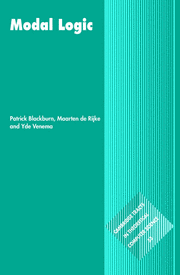Book contents
- Frontmatter
- Dedication
- Contents
- Preface
- 1 Basic Concepts
- 2 Models
- 3 Frames
- 4 Completeness
- 5 Algebras and General Frames
- 6 Computability and Complexity
- 7 Extended Modal Logic
- Appendix A A Logical Toolkit
- Appendix B An Algebraic Toolkit
- Appendix C A Computational Toolkit
- Appendix D A Guide to the Literature
- References
- List of Notation
- Index
5 - Algebras and General Frames
Published online by Cambridge University Press: 05 July 2014
- Frontmatter
- Dedication
- Contents
- Preface
- 1 Basic Concepts
- 2 Models
- 3 Frames
- 4 Completeness
- 5 Algebras and General Frames
- 6 Computability and Complexity
- 7 Extended Modal Logic
- Appendix A A Logical Toolkit
- Appendix B An Algebraic Toolkit
- Appendix C A Computational Toolkit
- Appendix D A Guide to the Literature
- References
- List of Notation
- Index
Summary
In this chapter we develop an algebraic semantics for modal logic. The basic idea is to extend the algebraic treatment of classical propositional logic (which uses boolean algebras) to modal logic. The algebras employed to do this are called boolean algebras with operators (BAOs). The boolean part handles the underlying propositional logic, the additional operators handle the modalities.
But why algebraize modal logic? There are two main reasons. First, the algebraic perspective allows us to bring powerful new techniques to bear on modal-logical problems. Second, the algebraic semantics turns out to be better-behaved than frame-based semantics: we will be able to prove an algebraic completeness result for every normal modal logic. As our discussion of incompleteness in Section 4.4 makes clear, no analogous result holds for frames.
This chapter has three main parts. The first, consisting of the first three sections, introduces the algebraic approach: we survey the basic ideas in the setting of classical propositional logic, extend them to modal logic, and prove the Jónsson-Tarski Theorem. The second part, which consists of the fourth section, introduces duality theory, the study of correspondences between the universe of algebras and the universe of frames. The last part (the only part on the advanced track) is devoted to general frames. These turn out to be set-theoretic representations of boolean algebras with operators, and we examine their properties in detail, and use them to prove the Sahlqvist Completeness Theorem. Background information on universal algebra can be found in Appendix B.
- Type
- Chapter
- Information
- Modal Logic , pp. 261 - 331Publisher: Cambridge University PressPrint publication year: 2001
- 1
- Cited by

